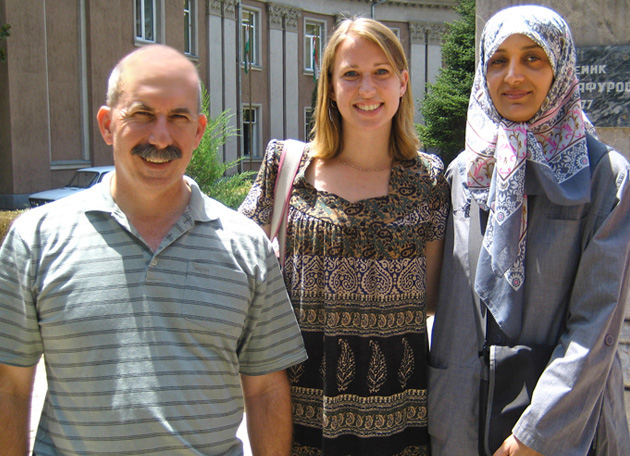
Spending the summer with a community that practices a mystical form of Islam is not a typical study abroad experience. But for master’s student Hannah Highfill, it got her one step closer to fulfilling her dream of becoming an Islamic studies professor.
Highfill, who is pursuing a master’s degree in Islamic studies in Arts & Sciences, received both a 2010 and 2011 U.S. Department of State Critical Language Scholarship to study in Tajikistan. This past summer, she participated in intensive Persian language instruction and conducted research on contemporary Sufi groups — communities that practice a mystical form of Islam with the guidance of a spiritual master.
“I’m trying to understand how Sufi brotherhoods adapt to our modern landscapes of international economic systems, family structures and globalized theological debates,” she says.
“I’m trying to understand how Sufi brotherhoods adapt to our modern landscapes of international economic systems, family structures and globalized theological debates,” she says.
Her research interests began during a class on modern Islamic civilization at the University of North Carolina at Chapel Hill. (She received a bachelor of arts in international studies there in 2009.)
“The professor, Omid Safi, was jarring in his presentation and overwhelming in his reading assignments,” Highfill says. “On the first day of class, he stacked books almost three feet tall on the front table — ones that we were expected to read.”
Although initially intimidated by Safi, Highfill gathered the courage to approach him for advice on a grant she had received to study in Turkey.
“It turned out that Professor Safi’s jarring presentation was just a teaching tool,” she says. “Upon approaching him, I found him to be very humble and kind.”
He set her up with a Sufi group in Istanbul — and has been a mentor and friend since.
“I lived with members of the Sufi group for six weeks, conducting interviews, attending rituals, and researching their teaching methods,” Highfill says. She wrote an honors thesis based on her work and received highest honors on her degree for it.
At the urging of Safi, Highfill came to Washington University for graduate work. “He knew Ahmet Karamustafa [professor of history and religious studies and chair of the Department of Jewish, Islamic and Near Eastern Languages and Cultures in Arts & Sciences] and Fatemeh Keshavarz-Karamustafa [professor of Persian language and comparative literature in Arts & Sciences] and felt that I would be in good, caring hands.”
Highfill credits Karamustafa for sparking her aspirations for the future. “He is showing me how to be meticulous and factually astute in the study of what is a mystical and sometimes ephemeral religious tradition,” she says. “He is also helping me find my own academic path as opposed to retracing the steps of other academics who have preceded me.”
Currently, Highfill is studying in Paris at the Sorbonne. “I plan to write a thesis on the Alawiyya, a Sufi group of Algerian origin with a large presence in France,” she says.
Afterward, she plans to return to Washington University to finish her graduate studies.
Comments and respectful dialogue are encouraged, but content will be moderated. Please, no personal attacks, obscenity or profanity, selling of commercial products, or endorsements of political candidates or positions. We reserve the right to remove any inappropriate comments. We also cannot address individual medical concerns or provide medical advice in this forum.